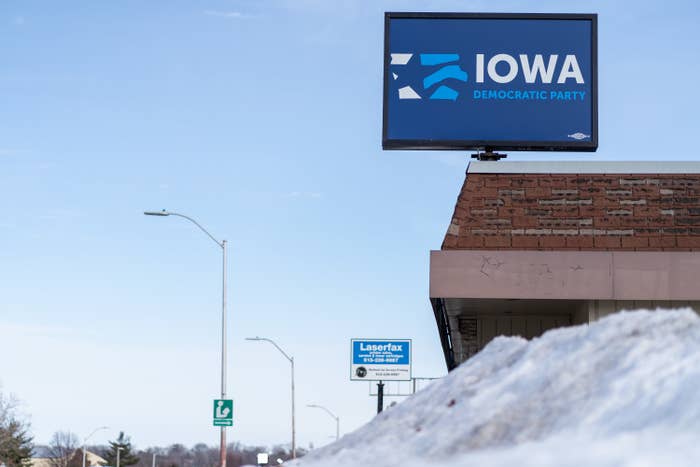
DES MOINES — Iowa Democratic officials told campaigns they plan to release the “majority” of the state’s caucus results by this afternoon, sparking concerns and complaints across the crowded field in what has been a remarkable false start to the nominating process.
The results in Iowa, the state that kicks off the Democratic primary every four years with its own complicated system of voting, have been a continued catastrophe for Democrats after the party promised to reform the caucus process following the 2016 election.
Because of a “coding issue” with the app-driven system that party officials used to report results on Monday, Democrats still have no winner in the first nominating contest, stunting three leading campaigns that had each declared some form of victory by late evening.
On a conference call with presidential campaigns on Tuesday morning, Iowa Democratic Party Chair Troy Price estimated that this afternoon's release will reflect more than 50% of the results.
"We want to get some results out there, and so we will be doing that at 4 p.m. [CT] today," he said. “I don’t want to put a number on it, but it’s more than 50% of results.”
Price, a lifelong Iowa Democrat who has worked for two years to try to make the complex caucus system here fairer and more transparent, said his team has been working through the night to try to gather results and secure “paper verification” from every precinct to clarify data inconsistencies.
On the call, which BuzzFeed News listened to, campaign aides expressed concern that people would take the initial and sole release so far as the "final number."
Campaigns are also worried about a future issue: The same reporting app that led to user errors and data inconsistencies in Iowa on Monday was due to be used in Nevada caucuses in three weeks, multiple campaigns said.
But in a statement today, Nevada Democratic Party Chair William McCurdy II said the state “will not be employing the same app or vendor used in the Iowa caucus,” and that it had developed “a series of backups and redundant reporting systems.”
Jeff Weaver, a senior adviser to Bernie Sanders, said the campaign hasn’t yet contacted Nevada officials about the app. “But we will shortly be turning our attention to the potential use of this app, which would be completely off the table from our point of view,” he said.
"We have to find out more information,” he added, “but clearly if they're using this app or any variation of this app, that cannot be allowed to happen. There are things called texts, emails, and telephones that can be used as a reporting tool."
Still, Weaver — a critic of the 2016 Iowa caucus, which resulted in a virtual statistical tie between the candidates — said he believed Iowa Democrats would get the results correct.
"I'm confident this time around,” he said, “because of the fact that they have to show the math and have a hard copy receipt from every caucusgoer, that eventually we will get the results and they're going to be the correct results."
The failures with the reporting process created the nightmare scenario.
By the end of caucus day in Iowa, the state’s Democratic Party had still not released any official data about the results. And during a late-night conference call with campaigns, the party said it won’t release results until Tuesday.
A major cause: Due to “user error” with the reporting app, there were some slight “inconsistencies,” according to participants on the call. Some numbers, the party said, “didn’t add up.”
The party told campaigns it was comparing the app results with cellphone pictures of the caucus paper worksheets, on which results are recorded by hand. At 10 p.m. CT on Monday, a time the party has usually released the majority of results, officials told campaigns they had just 35% but did not release any.
Caucuses are notoriously complicated, requiring time and math on the part of local volunteers. Largely because of the demands they place on people to access the events, state parties have worked to limit the number of caucuses in recent years.
Still, the caucuses in Iowa and Nevada remain the principal nominating events in the presidential nominating process. In 2016, the Clinton campaign tried to collect results with its own version of a reporting app (called “Reporter”). In the end, the experiment yielded a bunch of iffy numbers simply because of human error.
Without results, a few campaigns essentially claimed victory late Monday, and almost all candidates gave pseudo victory speeches.
"By all indications, we are going on to New Hampshire victorious,” Pete Buttigieg said.
The Sanders campaign released its internal data, pointing out that while it did not have 100% of precincts, it believed it led on both the first and final alignment, with Buttigieg in second place and Elizabeth Warren in third. Warren’s campaign manager said, “We’re confident that it’s close at the top between Warren, Sanders, Buttigieg. I believe the vice president is a distant fourth.”
As of Tuesday morning, the Sanders campaign's internal reporting system showed him leading Buttigieg, based on data from about 50% of precincts, Weaver said.
The general counsel for Joe Biden’s campaign, meanwhile, sent a letter to the Iowa Democratic Party, raising concerns about the reporting process and requesting more information about the “quality control” program the party had put in place.
“Last night was an extremely bad night for Joe Biden's campaign,” Weaver said. “He wildly underperformed, and so I can understand why they’d be upset about having the results released."

